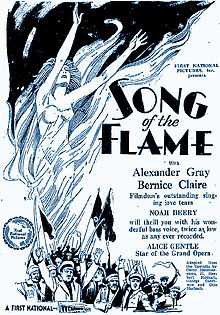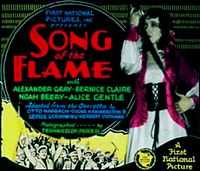Song of the Flame
| Song of the Flame | |
|---|---|
 | |
| Directed by | Alan Crosland |
| Written by |
Gordon Rigby based on the 1925 operetta by Oscar Hammerstein II and Otto A. Harbach |
| Starring |
Alexander Gray Bernice Claire Alice Gentle Noah Beery |
| Music by |
George Gershwin Harry Akst Jay Chernis Grant Clarke David Mendoza Herbert Stothart Edward Ward |
| Cinematography | Lee Garmes (Technicolor) |
| Edited by | Alexander Hall |
| Distributed by | First National Pictures: A Subsidiary of Warner Bros. |
Release dates |
|
Running time | 96 minutes |
| Country | United States |
| Language | English |
Song of the Flame (1930) is an all-talking pre-code musical operetta film photographed entirely in Technicolor. It was produced and distributed by First National Pictures, a subsidiary of Warner Brothers. It was the first color film to feature a widescreen sequence, using a process called Vitascope, the trademark name for Warner Bros.' widescreen process. The film, based on the 1925 Broadway musical of the same name, was nominated for an Academy Award for Sound Recording (George Groves).[1]
Film

Bernice Claire, known in the film as The Flame, is a young peasant girl who incites the people against the Czarist regime and the aristocracy through singing. Alexander Gray, who plays as a prince who is the leader of a group of Cossack troops, falls in love with Claire, even though she is part of a revolution that is dead set against his social class. Noah Beery is also part of the revolutionaries who are attempting to overthrow the Czarist regime. After meeting Claire, he also falls in love with her, much to the anger of his lover, who is played by Alice Gentle. The revolutionaries success in overthrowing the czarist regime leaving Gray and his aristocratic class in peril for their lives and fortunes. Beery becomes the new leader and his brutal treatment of the people make many regret having supported the revolution in the first place. After Beery attempts to seduce her, Claire flees to a village in her native Poland. Gray, fleeing from the new regime, happens to arrive at the village. When he meets Claire again he decides to stay. They put their political differences aside and become romantically involved. Hearing from his spies that the Prince is at a Polish village, Beery quickly goes there and arrests Gray and announces that he attends to execute him. Claire desperately attempts to free Gray by agreeing to have sex with Beery. Gray is released from prison through this ruse and when is it discovered that she had no intention of keeping her side of the bargain she is thrown into jail. Gray disguises himself and attempts to free Claire but he is discovered and imprisoned again. Before they can be executed, Alice Gentle, revealing the real reason behind Beery's execution order, tells the troops to release both Gray and Claire. Beery is arrested soon after as a traitor to the revolution by the troops and executed. Claire and Gray are left free to pursue their romance.
Cast
- Alexander Gray - Prince Volodya
- Bernice Claire - Aniuta, The Flame
- Noah Beery - Konstantin
- Alice Gentle - Natasha
- Bert Roach - Count Boris
- Inez Courtney - Grusha
- Shep Camp - Officer
- Ivan Linow - Konstanin's Pal
Music
Noah Beery was widely praised for his deep bass voice, which he first exhibited in this film in the song "One Little Drink." This song was satirized in the Bosko cartoon entitled: The Booze Hangs High (1930). Based on the success of this song, Warner Bros. subsequently cast Beery in a number of musical films, most notably in Golden Dawn (1930). The public was so enthralled by his singing abilities that Brunswick Records hired Beery to record songs from both of these films which were issued in their popular series.
Preservation
The film is believed to be lost. Only the soundtrack, which was recorded separately on Vitaphone disks, survives. The extant sound discs from this film reveal a very high quality Vitaphone sound - round, warm, and clear with good sound effects and a quality reproduction of speaking and singing voices as well as orchestrations. It would seem it fully deserved its Academy Award nomination for Best Sound. The score is a marvelously operatic one. All nine songs are preserved in the sound disc performances. There were four choruses as well, three of traditional Russian folk tunes and one drawn from Tchaikovsky's The Nutcracker.
Stage musical
The stage musical opened on Broadway at the 44th Street Theatre on December 30, 1925 and closed on July 10, 1926 after 219 performances. the music was by Herbert P. Stothart and George Gershwin, book by Otto Harbach and Oscar Hammerstein II, and lyrics by Otto Harbach and Oscar Hammerstein II. The musical was directed by Frank Reicher, dances and Ensemble pictures were arranged by Jack Haskell, and scenic design was by Joseph Urban. The cast included Phoebe Brune as Natasha, Greek Evans as Konstantin, Tessa Kosta as Aniuta ("The Flame"), and the 52-member Russian Art Choir. The musical takes place during the time of the Russian Revolution in 1917 and for several years thereafter.[2]
See also
References
- ↑ "The 3rd Academy Awards (1929/30) Nominees and Winners". oscars.org. Retrieved 2011-08-05.
- ↑ Pollack, Howard. "Song of the Flame" George Gershwin: His Life and Work, University of California Press, 2006, ISBN 0-520-24864-3, pp. 368-374
External links
- Magnified Grandeur - The Big Screen, 1926-31, David Coles, 2001
- Song of the Flame at the Internet Movie Database
| ||||||||||||||||||
| ||||||